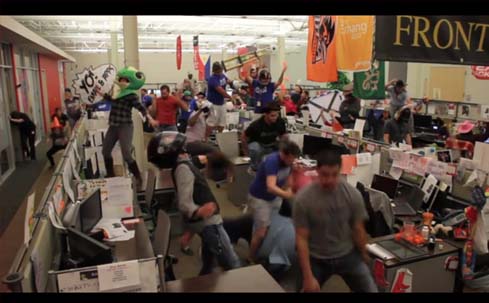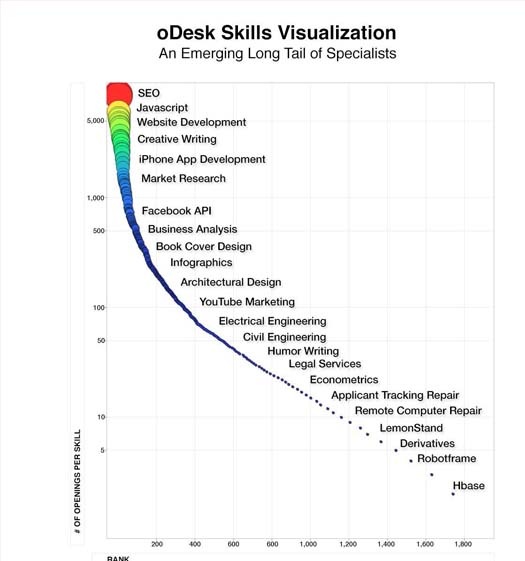
Maybe you’re a “freelo” (freelancer) like me, who decided to be free and happy. Perhaps you have your own project and you want to work with freelancers. Maybe you’re building a serious and established team of remote workers and need to know how to make things work well with people who you don’t even know. Whatever the circumstance is, managing people and tasks isn’t easy. Even less if these people are creative, independent, dreamy, who don’t like fixed schedules, need to earn money, and defend their time, so they can have a life outside of work.
Precisely because I’m that freelancer I just described, and because the Postcron blog is growing thanks each of you (THANKS 🙂 ), and so just like you, I also need to learn to manage a team of collaborators.
In order to do my job well, and not waste time or money, I did a lot of research to find out everything you need to know when it comes to working with people like me, or more complicated than me, and especially to not get any surprises down the road. In this post we’ll cover:
- The benefits of hiring freelancers
- The general profile of a freelancer
- What knowledge and skill sets are required
- How to choose the right people: step by step guide, tips, and interview questions
- Running a freelance team (of writers) efficiently and getting the job done excellently, without forgetting that at the end of the day, we should all be happy.
- Online tools for working as a team remotely.
1- What are the benefits of hiring and working with freelancers?
A super quick run through some reasons that’ll convince you to build a team of freelancers:

a- You’re not limited to the “local talent”. The Internet allows you to find the best talent, wherever it may be.
b- The same job in different cities may have different salaries due to the regulations of the labor agreements or labor policies of each state. For example, Silicon Valley is the “capital of the geeks” (I say that with love), where the best developers, engineers, and other talented geniuses live. If you lived there, hiring an engineer in the area, could cost you10 times more, just because of the fact that you’re in Silicon Valley. However, the advantages of working with freelancers allows you to break those physical barriers. You can negotiate salary, regardless of the “geography.”
c- Lately, the process of micro specialization or “long tail specialization” of job positions has been accelerating. You can find freelancers specialized in things that you’ve never even dreamed of. For example, this graph by oDesk explains it really well:

d- Generally, freelancers have worked for various clients and industries, which means they can provide much richer solutions and opinions because of their previous experiences.
e- Work schedules are no longer a problem or limitation.
f- The operational and input costs, basically disappear.
g- The talent search process is less bureaucratic and complex than how we traditionally do it.
h- The economic aspect, with good negotiations, can work out well for both parties.
i- Physical proximity does not actually ensure collaboration.
2- Personality traits of a freelancer: Are you ready to hire and work with one?
To start off on the right foot, when hiring and working with freelancers (writers, designers, developers, etc.), you need to understand that you’ll be hiring a person with a very similar profile to yours. You’ll have to work with someone who also thinks like you, who has chosen to be their own boss, be independent, and do what they like. A freelancer is the entrepreneur of their own life. Basically, they can be considered a “solopreneur”.
Precisely for this reason, I’ve found it extremely important to understand the personality of a solopreneur, since in this tribe, there’ll be two chiefs. You have to be smart and know how to dance with the other person, without stepping on their feet. This “dance” involves coordination and respect, because although one party has the money to pay, the other has the ability to perform the job.
So, we’ve got to understand, “our madness”: the general personality traits and/or attitudes of a entrepreneur/solopreneur/freelancer:

Surely, there are many more attitudes or characteristics that define us, but to some extent, these are what we all generally share. While researching for this article, I came across a book that although I haven’t completed it yet, seems very interesting for learning more about the personality of an entrepreneur and surely will help us understand our collaborators better: “Heart, Smarts, Guts, and Luck” (HSGL)
3- How to select the right freelance writer: A “step by step” guide, tips, and interview questions you shouldn’t leave out
3.1-The Step by Step guide: first define what you need, in order find out who you need.
Step 1:
It’s really important to know first, exactly what needs to be done: make a list of everything that your project will require. This is fundamental, as it will be extremely helpful when organizing the rest of the process. You’ll get an idea of how much money you have to invest, the time it will take, the knowledge and skills your future collaborator needs to have, how much patience you’ll need, etc..
If the project involves freelance writers, you musn’t forget to also define the purpose of the articles and what role they’ll have within your content marketing strategy: Will you use them to build community, to position your product, to generate awareness for your brand, for e-commerce, to inform, to retain customers, etc..? Be clear about this. It’ll also help you tons when defining the content strategy of your blog, newsletter, website, or content calendar with topics that can’t be missed, sources and references you can use to research and cite to create each article.
Another point (on the super detailed list you’ve made of everything, EVERYTHING you need for this project) you should include: how many times a month or a week you need the work to be done, the quality, and their level: basic, intermediate, or advanced.
Step 2:
How you want it done: you have to know what you want and how you want it. This will help you create the criteria and search for a freelancer who knows how to do things the way you want them to be done. If you’re not absolutely sure about this, you might end up hiring someone great, but that doesn’t have your style.
You need to do research: look for examples of jobs already completed and how they were executed. This will not only help you build a definite idea of what you like and what you want your work to look like, but it will also be useful for the freelancer to know what you’re aiming for.
In the case that you need to hire a freelance writer, you should collect several articles, and analyze the word count, style, tone, voice, structure, sequencing, concepts, use of links, statistics, types of examples, etc. We recommend putting together a guide where you list all of these aspects. Although it’s time consuming, you’ll be able to apply it in other future searches later on.
Step 3:
Time: before demanding the impossible, look for references about how long it takes to complete the kind of project you’re about to perform. Analyze your schedule, and the project’s. Consider the fact that if you find a good collaborator, they’ll most likely be a very busy person. A filter to hire someone, also lies in this aspect. Even if they’re an outstanding candidate, if they can’t meet your requirements, they won’t be a good fit. What we’re trying to say is, the availability of the writer has to be in line with the expectations you’ve listed in number 1.
Step 4:
You also need to be aware of your financial capacity.

Identify the maximum amount of money you can devote to this project and that way you’ll be able to negotiate wisely. Remember that if you want something excellent, you have to pay for excellence. The list of tasks you made in the beginning will also help you put together the budget.
We recommend that BEFORE hiring a freelance writer, both of you agree on a fixed price for the first article, like a “test-run”. That way, you can check the “expertise” of the writer, and later decide on the prices, based on the “expertise” demonstrated.
At this point in particular, you need to think about what criteria you’ll use to determine the price and the method of payment beforehand. What currency will be used, if the payment will be electronic, direct deposit, check, personally, or whatever, but make it clear. Also, if you’ll agree to give advances, and between which dates you’ll make the payments.
Step 5:
So, once you know the “how, what, when, and how much”, you’ve got to think about the logistics of teamwork. If you have a big group, do you have a platform thats works as an online office? Will you need to keep track of the all of the assignments? If so, the job might require a platform for managing tasks and projects. Do you have Skype, Gmail, and Dropbox or know how to use Google Drive? Does your laptop have a camera and microphone? These are basic things, but believe it or not, some people forget about these little details.
Some tools you can use to make life easier:
Skype and Google Hangouts: In the case that your team isn’t that big, these platforms are ideal for one-on-one conversations using conference calls or video chat. You can chat, use screen sharing, share documents, and invite others to participate in the conversations.
Google Drive and Dropbox: allow you to create, store, and share information in the cloud. Everything important will be available to everyone on the team on line and accessable from all your devices.
Campfire: a tool for collaborative communication for teams. It has chats, “meeting rooms”, blackboards, and dozens of other features that enhance communication and daily work among team members.
Basecamp: A tool for managing projects. It’s one of the most important and most used throughout the world. It allows you to easily manage and control from simple projects to very complex ones.
Evernote for businesses: it’s both a platform to save and share information, as well for working as a team.
Getflow: another tool for managing tasks, projects, having online discussions and sharing information .
Step 6:
Legal issues and “extras”: Keep in mind that it might be necessary to have some sort of exclusive contract that states that the other person can’t work for the competition, or that the material created remains under the ownership of your name or brand. These seem like nitty gritty details, but they can become a real headache in the future, if not thought out thoroughly beforehand.
3.2- Basic Skill Set all freelancers should have:
Now you know what you want and how you want it. However, before jumping into that first interview, you should know that besides the obvious basic knowledge and skills that for example, a writer should have: grammar, syntax, semantics, writing, organizing concepts, proper use of voice, tone, etc., etc., etc, there are other necessary skills that all freelancers should have in order to work well, beyond doing their JOB. This will help you build a happier relationship with your collaborator:
- Communication. In this type of work, if dialogue and clear expression of ideas, differences, and opinions, is not installed as a custom among collaborators, the results can be disastrous.
- Time Management: this style of work requires a person who’s organized with their tasks and personal life, committed, and true to their word. Obviously their schedule is flexible, but the goals must be met according to the schedule stipulated and agreed on beforehand.
- Flexibility: many things change along the process of completing a project. A freelancer has to be prepared to do, and redo, and redo things.
- Interpersonal Relationships: it’s true that we work alone, but that doesn’t mean that we don’t have to deal with other people on a daily basis. Here, communication comes into play, respect, consideration for others, patience, and everything you need so that the work day doesn’t end in war.
- Ability to negotiate: one has to know how to negotiate ideas, money, schedules, etc., in order to move forward with the selection process.
- Ability to solve problems: a good freelancer knows how to solve problems creatively and quickly. Being proactive is key.
- Ability to Research: a freelancer, no matter how talented and intelligent they are, they must have that curiosity and initiative to learn and know more. And also to be humble, even if its to see if what they say and do is still valid.
- Patience: working with people you don’t know requires lots of love and patience, just as much from you as from your freelancer.
- Stress management: it’s useless to have a freelancer that gets to the point of feeling so overwhelmed that they give up and quit half way through the project.

- “Hard Skills”: Besides knowledge of their profession and skills to be an effective collaborator, a freelance writer must have certain skills and the necessary logistics to preform their job and make them “writer 2.0.” What do we mean by that? They must have: access to a stable internet connection, basic tools for image editing (Photoshop, Illustrator), knowledge of social media, Google Trends, SEO tools, basic HTML, and WordPress. Also, they’ve got to understand the tricks to “clickeability” for writing viral headlines and generating clicks, as well as understanding or managing other languages.
3.3- Questions you can’t forget to ask while interviewing your freelance writer candidate
After completing each of the steps above, you’ll be well prepared to give interview efficiently. Don’t forget to ask these important questions, and you’ll get all the answers you need in order to make the right decision.
Although portfolios and résumés are very important, you get much more valuable information from a one-on-one conversation you have with the candidate. There are certain answers that say much more about the type of person and collaborator they’ll be, beyond the “expertise” their résumés claims to have.
Take a look at the questions are below, and what’s great is that you can also print them out by going to this spreadsheet. CHANGE LINK

Interview Questions:
- Do you have knowledge about the project tasks and topics that I’d like to develop in the articles? Can you give me an example of your work to review?
- I noticed “Article X/ Design X/ Work X”, and I would be interested to know how you came up with it, and what the process you go through to get there is:
- Which industries or categories to find it easiest to write about? Which ones do you prefer?
- What kind of content do you create or specialize in? Articles, interviews, eBooks, tutorials, etc…
- What tone do you feel most comfortable writing in?
- How comfortable do you feel about doing interviews?
- How do you learn about new topics that you’re asked to write about?
- What is your research methodology? How long do you set aside for research?
- Do you know how to optimize content for search engines?
- Describe what you consider to be the correct and complete visual structure for an article.
- What is your process of revision/editing?
- What are your work hours as a freelancer?
- How are you used to getting your payments and what criteria do you use to charge them? By the hour, project article, words, etc,.
- What level of commitment can you give to this project?
3.4 – Filters for selecting a freelance writer: little details that’ll help you figure out if you should hire that candidate or NOT
Good, you’ve had your first contact or interview with the candidate. Now, you should consider the details listed below, because they’ll help you know whether you should continue interviewing that person or not.
a- Were they punctual for the interview? If they were late, did they let you know ahead of time and give “X” reason? (That would be a sign of respect)
b- During the interview did they express themselves with appropriate language? Were the answers clear and did they respond directly to the questions?
c- In their application, or perhaps in their cover letter: Did they have good spelling, grammar, and correct use of punctuation? Was the presentation structured well? Did they express their ideas well in writing?
d- Are they detail-oriented? We’ll show you how we check this here at Postcron. In the email we send to applicants, which by the way is quite long, we include a “keyword” the applicant must use in the “subject” of the email when they respond. If the person isn’t detail-oriented, and reads quickly or just scans the text without taking the time like they should, we’ll know it instantly because they won’t include this little detail in their reply.
3.5- Sites where you can start your search:
Remember when creating your ad to find your future collaborator, keep in mind aaaaallllllll of the above information, and make all the points that are important to you very clear for your future candidates.
Linkedin
Freelancer
Workana
Twago
Nubelo
Elance
Fiverr
Toptal (Toptal’s admission process is tough, ensuring a high-quality talent pool)
People per Hour
4- How to manage and work with freelancers without going crazy while trying
As I mentioned in the beginning, you have to be prepared to work with someone who’s similar to you in nature. To make things work efficiently and HEALTHILY, you must work as a team. That’s exactly why I want to share this video of the Spurs with you. Besides the fact that I think it’s awesome, for me, it summarizes the basic values that every team needs to have in order to be successful. Whether it’s a football team, a team of entrepreneurs, freelancers, vendors, chefs, or whatever, to get good results, you need what I’m about to show you: “The Beautiful Game: San Antonio Spurs”
Inspiration time!:
https://www.youtube.com/watch?v=aPaH44ISY20
Managing people requires the same basic skills and practices whether it’s virtually or in person. What changes is the “style” and/or “format”.
To do this well and successfully, it’s SUPER necessary to take into account the following points:
- More than a boss or manager, your job should be to coach or mentor. You’re not only here to control, we must encourage, guide, and improve productivity.
- Communication. Important issues such as announcements, tasks, objectives, modifications, etc., need to be settled in writing. Try to work this way in order to avoid misunderstandings and assumptions.
- You should know how to clearly indicate objectives, which should also be measurable, specific, and achievable. That way, your collaborator knows exactly what you expect from them and what needs to be done. Here, it’s necessary to ensure that both parties understand and share the same notion of the meanings of these aspects. What does “excellent” mean to your collaborator? What does it mean to you to “respond in a timely manner”? This helps make expectations more realistic for everyone.
- Define work schedules . It’s necessary to agree on what time the collaborator needs to be available to deal with anything that comes up and to avoid unnecessary delays, like waiting for a simple answer for hours. In addition to setting up schedules, you should greet your partners at the start or end of each day, it’s part of mutual respect and consideration. Beyond that, don’t forget that on the other side, your collaborator also has a life, and they don’t breathe just to serve you. You have to respect that fact and understand that if you send them a message after their indicated hours, it’s possible that you won’t get a reply till the next day.

- Your team or collaborator needs to know what they can count on you for. You must be available and predisposed to answer their questions or concerns, because for the lack of one simple question, they might waste their time, money, and resources.
- Let go of the “obsessive control”. Obviously no one going to do things as “good” as you would, but you’ve still got to learn to relax and trust other people.
- Encourage your collaborators: it’s necessary from time to time, to know that things are going well thanks to the sacrifice and dedication of all parties. It’s amazing how a word of encouragement, gratitude, or appreciation, can motivate a person to work much harder and on top of that, better. Here at Postcron because we work remotely too, and in our daily communication we try to use funny images, gifs, emoticons, and everything that contributes to the motivation and good energy for the whole group! For example, to respond to the question: how was your weekend? If it didn’t go well, we might send this gif:

- Hold regular meetings: exchange news, progress, glitches, doubts, etc.,
- Get to know your collaborator on a deeper level, and discover what other areas they have potential in and are passionate about. Their other skills could help you out in the future, or to perform others tasks you need that maybe they’re actually better at.
In addition to general issues, it’s also important to consider these specific aspects in order to work efficiently with freelance writers:

- If the writer is going to write about your company or product, provide him/her with all the information related to the product and your company. Are there details of project that don’t show up in the “About” section of your website? You must be able to convey the spirit of your project or company.
- Provide them with the reader profile and explain the purpose of each article.
- Provide them with a post guide so that they know: the style, length, editing aspects, and other requirements that you need to be fulfilled.
- Give them examples of articles that can serve as models of how the final draft “should look like”.
- Review: at the beginning, it’s recommended that the writer type up the first point of the article, and submit it for review. This will let you know if the style, approach, drafting, and development, is what you expect, and above all, avoid that the writer drafts the entire article, and then has to fix everything.
Summing up:
Let go of the big “boss” role and learn to work as team and consider your freelancer as a collaborator working along side you. Your job isn’t to be a manager, but rather be a coach and mentor: motivate, stimulate, encourage, and trust.
When you’re clear about what you want, define how you want it, that way, you’ll be able to find who you want more precisely.
